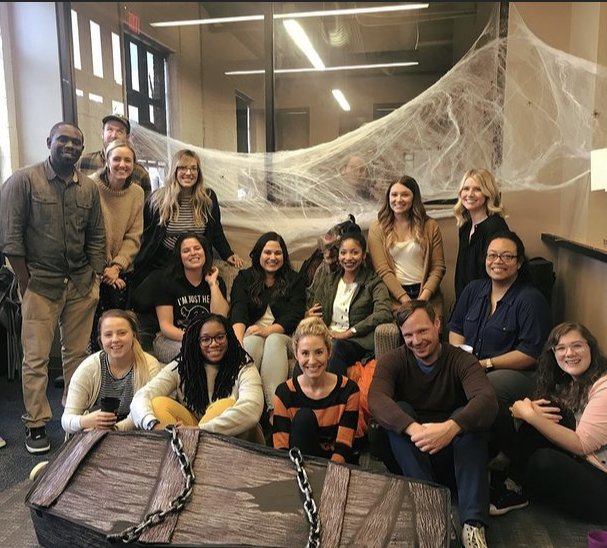My Coworkers Don't Talk To Me: Creative Ways to Make Authentic Work Friendships
Isolation is one of the worst feelings, and it’s even more oppressive in a work environment. In a perfect world, cliquish behavior and insecurity would be phenomenons confined to high school.
Unfortunately, these issues can impact us even as adults, causing coworkers to ignore you or worse, not even speak to you. Luckily, bad behavior isn’t always to blame. It can be difficult to form new relationships as adults, and there are some steps you can take to make authentic friendships at work.
When I started working in Nashville initially, I was commuting from Kentucky in order to save some money while I waited for my lease to end. While this was definitely the right move for my family at the time, I was extremely insecure about the fact that I didn’t live in the same area as my coworkers (which is funny in hindsight, now that so many of us are remote).
Although we did a lot of work activities, I worried that I was missing out on organic experiences and chances to make friends outside of work. Fast forward several years later, and I have friendships from that job that are so important to my happiness and social wellbeing.
So, what changed? How did I form those authentic friendships at work? In this post, we’ll talk about some things I learned, steps you can take, and also, what not to do.
So, buckle up! Here are the steps to making authentic friendships at work, plus what to do if your coworkers don’t talk to you.
My team and me at my first job in Nashville, taken a month after I started.
How to make friends at work
Ask people about themselves
Be willing to listen
Remember details (e.g. birthdays, allergies, etc.)
Propose new forms of connection (e.g. lunch outings, book clubs, etc.)
Bonus: Do something nice and unexpected
Ask people about themselves
If you’ve ever been around someone who talks about themselves constantly, you know it gets old fast. Putting yourself out there and being vulnerable is great, but if you find yourself monopolizing the conversation, you may want to pause and start asking other people questions.
In fact, studies show that the more follow-up questions you ask about someone, the greater probability they are to like you.
Feeling stuck on what to say? Here are some polite questions you can ask:
Do you have any pets?
How old are your kids?
What are some fun things to do here (or wherever they live)?
How long have you been in this industry?
Be willing to listen
Now that you’ve asked people about themselves, it’s time to listen. Really listen (instead of, say, waiting for your turn to talk).
Active listening is the art of understanding what your coworkers say, then repeating it back to them for clarity. Active listening is even being taught in schools, because studies show students who actively listen perform better, feel less frustrated, communicate better, and earn better relationship skills.
If good listening skills improve the classroom this much, it stands to reason that the workplace could be improved, too. Try listening more, and see how your relationships at work improve.
Remember details
Let’s say your coworker has an allergy to peanuts, and they’ve mentioned several times. Then, you bring peanut butter cookies to the office and offer them one. You haven’t done anything wrong, per se, but that person probably won’t feel too impressed. In fact, they may not feel they can come to you with important issues, because you’re not taking the time to learn about them.
On the other hand, when you remember details and show compassion for coworkers, you also show that you care. Any time you remember a birthday or life event, you’re making an effort to have a positive relationship with your team. What’s more, knowing more about someone can help you anticipate reactions and plan better.
Studies show that even romantic relationships are improved by remembering details and conversations, and that these memories can reduce arguments and misunderstandings, too. Apply this to your work relationships, and see what happens.
Propose new forms of connection
When you work in an office, there are several ways you can potentially connect with coworkers. Grabbing coffee, joining a local class together, or getting lunch are all ways you can organically get to know your peers.
But what if you work remotely? In today’s landscape, it’s not unusual to be the only one in your city (and in some cases, region). In that case, you might try a team Zoom lunch or a virtual book club. Some workplaces even have more niche groups, like fan clubs and writing workshops.
If you do work with someone who lives nearby, why not propose a coffee date? Meeting up somewhere to work is an easy way to get to know someone.
Bonus: Do something nice and unexpected
This suggestion is purely up to you, because not everyone has the capacity to do nice things for their coworkers, especially if they’re not feeling particularly welcoming!
Still, for teams that work in-person, a box of donuts or a tumbler of coffee can go a long way. By doing something nice and unexpected, you create an environment that’s more opportune for friendship. If you work online, a card or flowers during a difficult time can also encourage positive relationships.
Making friends at work: What NOT to do
Don’t act out
Avoid getting “preachy”
Be authentic
Admit when you’re wrong
Don’t act out
If you feel lonely at work, it’s easy to feel resentful. Cliquish and difficult coworkers can make us want to act out. However, it’s important to stop and think, because knee-jerk reactions can come back to haunt you.
For instance, we’ve all vented on a company messaging system, but the more you do this, the more likely you are to say something publicly by accident. (Take it from someone who knows.)
And that’s just one example. In fact, there are several other ways a person can “act out,” whether it’s by pushing back unnecessarily, making rude jokes, or worse. It may feel good to do these things in the moment, but it reflects poorly on you, and it won’t win you any friendships.
Avoid getting “preachy”
Have you ever gotten advice you didn’t ask for? Maybe from someone you barely knew? If so, you know how frustrating it can be. In the same way, unsolicited career advice can be a huge turn-off for potential work friends.
Some suggest this is due to the theory of reactance, a psychological idea that people will react defiantly when their behavioral freedoms are threatened. (For example, “You should try smiling more,” may lead you to smile less.)
Instead, some psychologists argue, you should model good behaviors if you want people to respect your judgment. And remember, if you don’t know about something, don’t pretend you do. Respect is earned, not forced.
One psychologist suggests that condescension may be a form of envy, so if you feel the need to talk down to someone, take a step back and consider your emotions.
If you really do want to give advice, that’s fine! But validate their feelings first. Here’s an example: “That’s a really hard situation to be in. I’m sorry you’re going through that. Maybe you could approach it this way.”
Be authentic
People can usually tell when you’re being fake. And maybe that’s because authentic people tend to be happier, more fulfilled, and better at forming relationships. So, why are people disingenuous if this is the case?
Often, we self-monitor to avoid confrontation, or because we think we need to act a certain way in order to be liked or respected.
Admittedly, confrontation is uncomfortable. Still, if you can put up with a few minutes of discomfort to have a better working relationship, it may be worth it in the long run.
There’s no need to don a saccharine voice or tell someone you’re not upset when you really are. You can be polite and honest at the same time. By being thoughtful and straightforward with those around you, you show respect for your own feelings, as well as the feelings of the people around you.
Admit when you’re wrong
This one is huge! If you mess up, tell someone. Your work impacts the work of other people, and often, other teams. So, if you make a mistake, the sooner you can correct it and get past it, the better.
But it’s hard to admit you’re wrong. In fact, it can threaten your sense of self-worth or even make you feel beholden to those you’ve wronged. Still, the sooner you recognize your capacity for human error, the smoother your workdays will be.
Here’s an example from one of my jobs. Several years ago, my team and I were tasked with updating old blog posts. I made changes to a particularly high-ranking post, and I completely changed the SEO value. In other words, one of our main sources of search engine traffic was no longer working.
My manager’s boss wanted to know who had changed it, and I sheepishly fessed up and apologized. Luckily, they were able to resolve it quickly, and even though it was really embarrassing, we sorted it out.
Now, if I hadn’t owned up to it, or if I’d lied, it would’ve taken much longer to reach a conclusion, and I could’ve lost the respect of my team. What’s more, my coworkers would have been in the uncomfortable position of ratting me out.
And the thing is, it’s easy to be wrong a lot. Maybe you’re sure a marketing strategy will work, but it doesn’t. Maybe you defended a decision that ended up being wrong. Admitting you’ve messed up shows your team you can take responsibility. What’s more, it indicates you can do the same in a friendship.
What if your coworkers still don’t talk to you?
Let’s say you’ve followed all the steps above, and your coworkers still don’t—or won’t—talk to you. We’ve talked about toxic coworkers before, and it’s possible you’ve found yourself in the middle of a whole group of them.
In this case, it’s important to remember: You deserve to be treated with respect. While HR and managers may be available to you, a different environment may be more supportive.
In the meantime, keep your head down and avoid getting involved in—I hate to use this word—drama as much as possible. You might even keep a running list of the projects you’ve worked on from week to week, just so you have proof that you’ve been working hard and completing projects.
Conclusion
If you’re feeling isolated or ignored at work, hang in there. It’s difficult feeling like coworkers don’t want to talk to you. Remember, though, it might just take some investment on your part. Your coworkers could be feeling the same way.
In the meantime, there are steps you can take in order to build positive relationships. Ultimately, friendships take time and effort, but they tend to be worth it.
However, if you feel like your coworkers aren’t worth that time, especially because of hostile behavior, it may be time to look elsewhere. Don’t be afraid to find a different job where you’re a better fit with the team.



